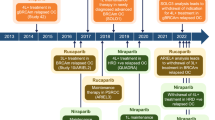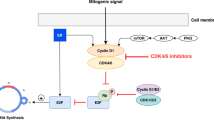Summary
Introduction This phase I, multicenter, open-label, single-arm, dose-escalation study evaluated the safety, pharmacokinetics and antitumor activity of APTO-253, an inducer of the transcription factor KLF4, in adults with advanced solid tumors. Methods APTO-253 was administered IV on days 1 and 2, and 15 and 16 of each 28 day cycle; the dose were escalated from 20 to 387 mg/m2 in 9 cohorts until DLT was observed. Results Thirty-two patients were treated on this trial (50 % colon cancer, 22 % other gastrointenstinal malignancies and 18 % non-small cell lung cancer). Fatigue was the only drug-related treatment-emergent adverse event to occur in >10 % of patients. Dose-limiting toxicities of hypersensitivity reaction and transient hypotension despite prophylaxis occurred at 387 mg/m2 which led to identification of 298 mg/m2 as the MTD. Only 1 patient had any drug-related treatment-emergent grade 3 adverse event at or below 229 mg/m2. A total of 21 patients underwent at least one restaging after 2 cycles; 11 patients discontinued prior to the end of cycle 2 due to adverse events (9) or disease progression (2). The best overall response was stable disease (SD) in 5 of these 21 (23.8 %) with durations ranging from 3.6 to 8.4 months. Conclusion APTO-253 was well tolerated at the Phase 2 recommended dose and produced evidence of antitumor activity in the form of stable disease in patients with advanced solid tumors. Based on the drug levels achieved and the lower frequency of treatment-emergent adverse events encountered, 229 mg/m2 was selected as the recommended Phase 2 dose. Overall APTO-253 was found to be well tolerated and to have favorable pharmacokinetics, and treatment was associated with stable disease in 5 of 21 (24 %) of patients with far advanced solid tumors.
Similar content being viewed by others
References
Zhao W, Hisamuddin IM, Nandan MO, Babbin BA, Lamb NE, Yang VW (2004) Identification of Kruppel-like factor 4 as a potential tumor suppressor gene in colorectal cancer. Oncogene 23:395–402
Dang DT, Chen X, Feng J, Torbenson M, Dang LH, Yang VW (2003) Overexpression of Kruppel-like factor 4 in the human colon cancer cell line RKO leads to reduced tumorigenecity. Oncogene 22:3424–3430. doi:10.1038/sj.onc.1206413
Ohnishi S, Ohnami S, Laub F, Aoki K, Suzuki K, Kanai Y, Haga K, Asaka M, Ramirez F, Yoshida T (2003) Downregulation and growth inhibitory effect of epithelial-type Kruppel-like transcription factor KLF4, but not KLF5, in bladder cancer. Biochem Biophys Res Commun 308:251–256
Wei D, Gong W, Kanai M, Schlunk C, Wang L, Yao JC, Wu TT, Huang S, Xie K (2005) Drastic down-regulation of Kruppel-like factor 4 expression is critical in human gastric cancer development and progression. Cancer Res 65:2746–2754
Wang N, Liu ZH, Ding F, Wang XQ, Zhou CN, Wu M (2002) Down-regulation of gut-enriched Kruppel-like factor expression in esophageal cancer. World J Gastroenterol WJG 8:966–970
Buttar NS, Fernandez-Zapico ME, Urrutia R (2006) Key role of Kruppel-like factor proteins in pancreatic cancer and other gastrointestinal neoplasias. Curr Opin Gastroenterol 22:505–511. doi:10.1097/01.mog.0000239864.73962.db
Yasunaga J, Taniguchi Y, Nosaka K, Yoshida M, Satou Y, Sakai T, Mitsuya H, Matsuoka M (2004) Identification of aberrantly methylated genes in association with adult T-cell leukemia. Cancer Res 64:6002–6009. doi:10.1158/0008-5472.CAN-04-1422
Guan H, Xie L, Leithauser F, Flossbach L, Moller P, Wirth T, Ushmorov A (2010) KLF4 is a tumor suppressor in B-cell non-Hodgkin lymphoma and in classic Hodgkin lymphoma. Blood 116:1469–1478. doi:10.1182/blood-2009-12-256446
Schoenhals M, Kassambara A, Veyrune JL, Moreaux J, Goldschmidt H, Hose D, Klein B (2013) Kruppel-like factor 4 blocks tumor cell proliferation and promotes drug resistance in multiple myeloma. Haematologica 98:1442–1449. doi:10.3324/haematol.2012.066944
Hu W, Hofstetter WL, Li H, Zhou Y, He Y, Pataer A, Wang L, Xie K, Swisher SG, Fang B (2009) Putative tumor-suppressive function of Kruppel-like factor 4 in primary lung carcinoma. Clin Cancer Res 15:5688–5695. doi:10.1158/1078-0432.CCR-09-0310
Zhang W, Geiman DE, Shields JM, Dang DT, Mahatan CS, Kaestner KH, Biggs JR, Kraft AS, Yang VW (2000) The gut-enriched Kruppel-like factor (Kruppel-like factor 4) mediates the transactivating effect of p53 on the p21WAF1/Cip1 promoter. J Biol Chem 275:18391–18398
Wei D, Kanai M, Jia Z, Le X, Xie K (2008) Kruppel-like factor 4 induces p27Kip1 expression in and suppresses the growth and metastasis of human pancreatic cancer cells. Cancer Res 68:4631–4639. doi:10.1158/0008-5472.CAN-07-5953
Chen X, Johns DC, Geiman DE, Marban E, Dang DT, Hamlin G, Sun R, Yang VW (2001) Kruppel-like factor 4 (gut-enriched Kruppel-like factor) inhibits cell proliferation by blocking G1/S progression of the cell cycle. J Biol Chem 276:30423–30428. doi:10.1074/jbc.M101194200
Li Z, Zhao J, Li Q, Yang W, Song Q, Li W, Liu J (2010) KLF4 promotes hydrogen-peroxide-induced apoptosis of chronic myeloid leukemia cells involving the bcl-2/bax pathway. Cell Stress Chaperones 15:905–912. doi:10.1007/s12192-010-0199-5
Zhou Y, Hofstetter WL, He Y, Hu W, Pataer A, Wang L, Wang J, Zhou Y, Yu L, Fang B, Swisher SG (2010) KLF4 inhibition of lung cancer cell invasion by suppression of SPARC expression. Cancer Biol Ther 9:507–513
Eisenhauer EA, Therasse P, Bogaerts J, Schwartz LH, Sargent D, Ford R, Dancey J, Arbuck S, Gwyther S, Mooney M, Rubinstein L, Shankar L, Dodd L, Kaplan R, Lacombe D, Verweij J (2009) New response evaluation criteria in solid tumours: revised RECIST guideline (version 1.1). Eur J Cancer 45:228–247. doi:10.1016/j.ejca.2008.10.026
Rowland BD, Peeper DS (2006) KLF4, p21 and context-dependent opposing forces in cancer. Nat Rev Cancer 6:11–23. doi:10.1038/nrc1780
Kharas MG, Yusuf I, Scarfone VM, Yang VW, Segre JA, Huettner CS, Fruman DA (2007) KLF4 suppresses transformation of pre-B cells by ABL oncogenes. Blood 109:747–755. doi:10.1182/blood-2006-03-011106
Faber K, Bullinger L, Ragu C, Garding A, Mertens D, Miller C, Martin D, Walcher D, Dohner K, Dohner H, Claus R, Plass C, Sykes SM, Lane SW, Scholl C, Frohling S (2013) CDX2-driven leukemogenesis involves KLF4 repression and deregulated PPARgamma signaling. J Clin Invest 123:299–314. doi:10.1172/JCI64745
Funding
This study was sponsored by Aptose Biosciences. No author received financial support related to the development of this article other than Dr. Stephen Howell who served as consultant for the preparation of the manuscript.
Author contributions
All authors participated in the collection and analysis of data, manuscript editing and provide final approval of the manuscript.
Compliance with ethical standards
ᅟ
Conflicts of interest
P. Murray and S. Zhou are employees of Aptose Biosciences the sponsor of this trial. Dr. Stephen Howell is a consultant to Aptose Biosciences. No potential conflicts of interest were disclosed by the other authors.
Ethical approval
All procedures performed in these studies involving human participants were in accordance with the ethical standards of the institutional and/or national research committee and with the 1964 Helsinki declaration and its later amendments or comparable ethical standards.
Informed consent
Informed consent was obtained from all individual participants included in this study.
Author information
Authors and Affiliations
Corresponding author
Rights and permissions
About this article
Cite this article
Cercek, A., Wheler, J., Murray, P.E. et al. Phase 1 study of APTO-253 HCl, an inducer of KLF4, in patients with advanced or metastatic solid tumors. Invest New Drugs 33, 1086–1092 (2015). https://doi.org/10.1007/s10637-015-0273-z
Received:
Accepted:
Published:
Issue Date:
DOI: https://doi.org/10.1007/s10637-015-0273-z




